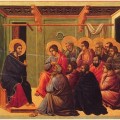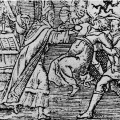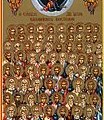I’m almost a little scared to offer my reflection on today’s reading. I’m reminded of a proclamation from the Lord to Ezekiel. In short God says “I’m going to give you something to tell them. If you don’t tell them and they stumble, then I’m going to hold you accountable for their fall.” (See Ez 33:1-8) I’ve related this sentiment a bit gentler than you’ll actually read it in the Book of the prophet Ezekiel, but after all, that’s Old Testament stuff.
The point is this. I’m concerned that if I tell you how this reading really speaks to me, then Christianity might come across as too difficult and I would risk driving people away from the Lord – that would be bad. On the other hand, if I water down the message so that it’s easier or “more acceptable”, then I’m guilty of presenting a false image of Christianity – that’s bad because embracing a false image of Christ is radically different than embracing the true Christ. Finally, I could be all wet. My impression could be wrong and misleading – and that would be bad too.
All that having been said, and after much prayer, I’m going to tell you how I see it. At least you’ll know why and you’ll know that I don’t offer this lightly.
The Would-be Followers of Jesus.
57 As they were proceeding on their journey someone said to him, “I will follow you wherever you go.”
58 Jesus answered him, “Foxes have dens and birds of the sky have nests, but the Son of Man has nowhere to rest his head.”
59 And to another he said, “Follow me.” But he replied, “[Lord,] let me go first and bury my father.”
60 But he answered him, “Let the dead bury their dead. But you, go and proclaim the kingdom of God.”
61 And another said, “I will follow you, Lord, but first let me say farewell to my family at home.”
62 [To him] Jesus said, “No one who sets a hand to the plow and looks to what was left behind is fit for the kingdom of God.”
The first man said he would Follow Jesus anywhere. Jesus told him that he has no place to lay his head. In effect Jesus is telling the would-be disciple that he will have no home. If you’re going to follow Christ, then you’ve got to be willing to leave your home, and the life that goes with it.
To the second man Jesus said “follow me”, but the man said “let me go bury my father.” This is not a light excuse. If the man’s father has died then he has an obligation to bury him. To do less would scandalize the family, bring shame upon the man, and quite likely cause him to fail in honoring his father and mother as commanded by the Lord. Yet Jesus essentially told him to let the others bury his father. Jesus said “let the dead bury their dead”. Recall that we’ve reflected before about how the word “dead” doesn’t always mean deceased. Jesus is telling this man to follow Him and that those who are spiritually dead can stay behind. [Our previous reflections which considered the spiritual meaning of “death” can be found in Debates about the Sabbath – Healing on the Sabbath (Luke 6:6-11) and The Conditions of Discipleship (Luke 9:23-27)]
The third man volunteers, “I will follow you … but let me first say farewell to my family.” If we remember our Old Testament well, then we would be reminded that this is what Elisha said to the prophet Elijah when his prophetic call came. In fact, Elisha was plowing when his call came and he did indeed leave everything behind – after he said his goodbyes. But to this man Jesus said no one is fit for the kingdom of God if they have set a hand to the plow, yet look behind them.
Try to picture the scene. Imagine someone plowing a field and doing it the right way. They’re looking ahead of them, their focused, and they can lay down row after row of perfectly plowed straight lines. The field will produce its maximum yield. Now contrast that image with someone who is plowing yet is looking behind them. Their lines will be sparse and crooked and the field will be poorly prepared for the crop. Jesus is telling this man about the kind of focus and dedication that’s required to be one of His followers.
The overarching message is that if you’re going to follow Jesus you have to be prepared to leave your former life behind. If you’re married that doesn’t mean you leave your spouse. It doesn’t necessarily mean that you’ve got to become homeless, or join the convent or monastery. The former life we need to leave behind is the life of our sinfulness. It’s the life of our gossip, our gluttony, our false witness, our slothfulness, our envy, our greed, our selfishness, and so on. It’s the life where we pass judgment on our neighbors, the life where we want our enemy to be condemned and to suffer, the life where we complain if we’re faced with suffering.
To leave that life behind we must not judge, we must love our enemies and pray for our persecutors, we must love our neighbors as ourselves, we must carry our cross, and we must love God with our entire being. We can say “I want to leave my sinful life behind” but remember, we’ve learned a lot about discipleship in this chapter. Our formation is going to take time. We’re going to stumble and when we do, we have to rededicate ourselves to the pursuit of a holy life. We can’t do it ourselves; it can only be done under Jesus’ watchful eye, so we have to hand ourselves over to Him entirely.
Let’s also notice that in this passage none of these men have provided their final answer. We don’t know if they’ve signed on as followers of Christ or if they’ve considered the Christian life too hard and the cost too high. Luke doesn’t record a response from them because we are the ones who are supposed to provide the answer. Will you leave the life you knew to follow Christ?
Our prayerful response can be to ask God for the grace to embrace a new life in Christ.
Related PostsScripture texts in this work are taken from the New American Bible, revised edition© 2010, 1991, 1986, 1970 Confraternity of Christian Doctrine, Washington, D.C. and are used by permission of the copyright owner. All Rights Reserved. No part of the New American Bible may be reproduced in any form without permission in writing from the copyright owner.




